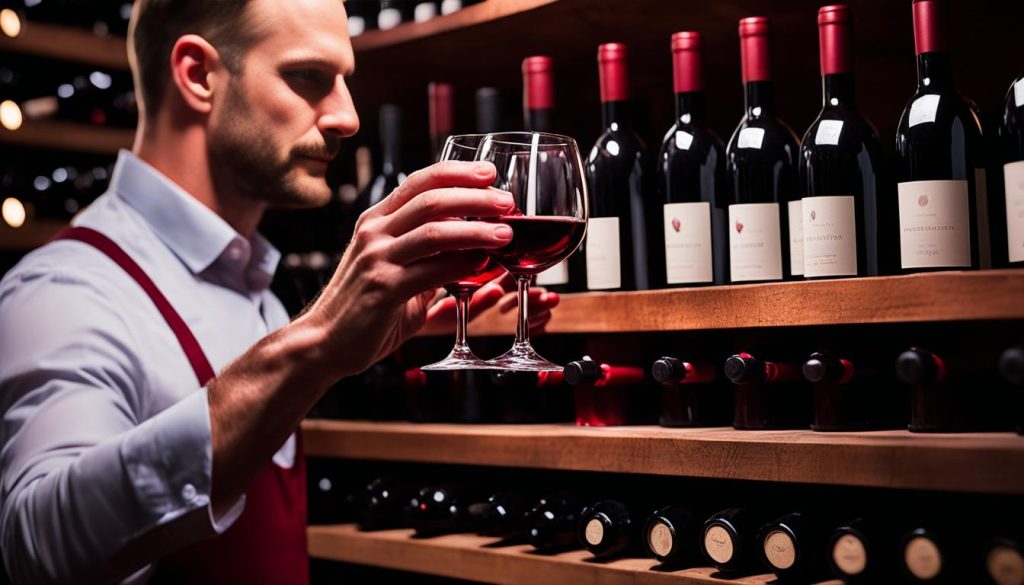Welcome to our guide on French wine tasting businesses. This article will share expert insights into the world of French wines and the business behind it. It’s for wine lovers, sommeliers, and those dreaming of a wine business. You’ll gain valuable knowledge to explore the intriguing world of French wine tasting.
- The Importance of French Wines in the UK Market
- Understanding the Art of Wine Tasting
- Types and Varieties of French Wines
- Key Regions and Appellations in French Wine Industry
- Trends and Innovations in the French Wine Tasting Business
- Establishing a Successful French Wine Tasting Business
- Marketing and Promoting French Wine Tasting Events
- Training and Certification for Wine Professionals
- The Role of Food Pairing in French Wine Tasting
- Building Relationships with French Wine Producers
- Navigating Regulations and Importation Processes
- Maximizing Profitability in the French Wine Tasting Business
- Challenges and Opportunities in the French Wine Tasting Business
- Embracing Sustainability in the French Wine Tasting Business
French wine tasting is a unique experience that captivates people. It involves exploring rich histories, diverse lands, and wonderful tastes.
This guide explores why French wines are so popular in the UK. We peek into the art of tasting, looking at what it takes to judge wines professionally.
We’ll also look at the various French wines you can find. This includes classics like reds, whites, and rosés, as well as sparkling and dessert wines. We’ll discuss the special features of each type and the grapes used in making them.
Additionally, we’ll visit key regions in France, such as Bordeaux and Champagne. We’ll learn how the ‘appellation’ system confirms the quality and origin of French wines.
Stay updated on the newest trends and innovations in French wine tasting. We’ll look at fresh ways of hosting tastings, tech advancements, and new wine styles.
For those interested in starting a wine tasting business, we have tips for you. We’ll talk about choosing wines, creating unique tasting events, and attracting customers in the UK.
Marketing is key for a successful wine business. We’ll explore how to promote your events using social media, work with influencers, and make events stand out.
Becoming a certified wine expert can boost your business. We’ll tell you about courses and certifications that can improve your credibility.
Pairing food with wine is an important skill. We’ll explore different food and wine combinations. You’ll learn about dishes that go well with different types of wine.
It’s crucial to have good relationships with wine producers. We’ll share tips for buying direct, visiting vineyards, and forming strong partnerships to get great French wines for your business.
Importing French wines to the UK has its challenges. We’ll discuss the necessary paperwork, taxes, and certifications to make the process smoother.
Making your business profitable is essential. We’ll talk about pricing, managing costs, and creative ways to increase sales. These strategies will help you succeed financially.
Finally, we’ll look at the challenges and opportunities in the UK’s French wine market. Understanding your competition and the trends will help your business grow.
Sustainability is key in the wine world. We’ll cover green practices and how to promote your eco-friendly efforts. This will appeal to customers who care about the environment.
Prepare for a thrilling journey into the French wine tasting world. Let’s uncover the art, business, and love that make French wines so special.
The Importance of French Wines in the UK Market
French wines have always been popular in the UK. They have charmed wine lovers across the nation. The rich history, outstanding quality, and various flavours make them stand out. It’s not a surprise people in the UK love French wines so much.
French wines are loved for good reason. France has a long history of making wine. Its vineyards date back centuries. Winemakers there use traditional methods that have been passed along for generations. This care and tradition result in top-quality wines.
The variety of French wines is another big draw. There are reds from Bordeaux, whites from Burgundy, bubbly Champagne, and sweet Sauternes. With such a wide range, there’s a French wine for every taste and occasion.
There’s more to French wines than just their taste. Drinking French wine often feels like sipping on history and culture. France is well-known for wine, and its wines are seen as sophisticated and elegant. They represent more than just a drink.
Numbers show just how much the UK likes French wines. The Wine and Spirit Trade Association says French wines are the leading choice in the UK. They account for a big part of all wines sold. This comes from people loving the trusted French brands, the influence of experts, and a wish to try wines from various French regions.
| Benefits of French Wines in the UK Market | Factors Contributing to Popularity |
|---|---|
| 1. Rich history and winemaking tradition | 1. Cultural significance and sense of tradition |
| 2. Exceptional quality and craftsmanship | 2. Reputation as some of the finest wines in the world |
| 3. Diverse range of flavors and styles | 3. Wide selection to suit varying preferences |
| 4. Symbol of taste, sophistication, and elegance | 4. Association with sophistication and refinement |
In the end, French wines are a key part of the UK’s wine scene. They bring tradition, quality, and variety to the table. Whether it’s to celebrate or relax, people choose French wines. They appreciate the craft and history in every drop. This ongoing love for French wines in the UK shows their lasting quality and appeal.
Understanding the Art of Wine Tasting
Wine tasting is an art that anyone can learn. It needs skill, knowledge, and a taste for the finer things. Whether you’re starting or you’re an expert, this art can make French wines more enjoyable.
At its heart, wine tasting is about exploring a wine’s many parts. You look at the wine, smell it, taste it, and feel its body. Through these assessments, experts learn about a wine’s quality and how long it might last.
To really understand a wine, experts use a step-by-step method. This way, they don’t miss a thing. The method involves looking, smelling, tasting, and then feeling the wine.
The Process of Wine Tasting
- Visual Examination: First, look at the wine closely. Check its color and how clear it is. This tells you about the grapes used, its age, and how it was made.
- Aroma Analysis: Next, give the glass a swirl to smell the wine’s aromas. Try to pick up fruity, spicy, or floral notes. These are called primary, secondary, and tertiary aromas.
- Taste and Palate Evaluation: Drink the wine and let it touch every part of your mouth. Notice the flavors, how balanced it is, and its structure. This step helps you understand the wine better.
- Body and Texture Assessment: Think about how the wine feels in your mouth. Is it light or full? Is it smooth or rich? These are the wine’s body and texture.
- Acidity Perception: Think about how fresh the wine tastes. Acidity makes a wine lively and often more interesting.
- Finish and Aftertaste: Lastly, consider how long the taste lasts. Does it stay on your palate? A long finish usually means the wine is of good quality.
With time, you’ll get better at tasting wine. Remind yourself that each person’s taste is unique. So, your likes and dislikes are part of what makes wine tasting fun for you.
Types and Varieties of French Wines
French wines offer a wide range of flavours and styles. They please wine lovers everywhere. From bold reds to elegant whites and fresh rosés, there’s a French wine to suit every taste. Let’s dive into what makes these wines unique.
Classic Reds
French red wines are known for their depth and ability to age. They come from various grape types, each adding a special aspect to the wine. Key regions for red wines are:
- Bordeaux: Famous for its strong red blends, Bordeaux wines mix Cabernet Sauvignon, Merlot, and Cabernet Franc.
- Burgundy: The home of Pinot Noir, Burgundy creates fine and subtle reds.
- Rhône Valley: This region is known for spicy and rich reds from grapes like Syrah and Grenache.
Elegant Whites
Fine, complex, and long-lasting, French white wines are a treat. They’re made from various grapes located all over France. Some standout white wines include:
- Champagne: Besides bubbly, Champagne creates expert Chardonnay whites with lively acids and gentle tastes.
- Burgundy: In Burgundy, Chardonnay shines, giving both crisp, mineral whites and rich, creamy ones.
- Loire Valley: From Sancerre to Vouvray, the Loire Valley is all about special whites like Sauvignon Blanc and Chenin Blanc.
Refreshing Rosés
Famous for being light and versatile, French rosés are very popular. They are made from red grapes but are less macerated, making them pink and lively. Notable rosé areas include:
- Provence: The top rosé location, Provence wines are light and fruity.
- Côtes de Provence: This region offers premium rosés with fine scents and a dry, fresh taste.
Sparkling and Dessert Wines
France also excels in sparkling and sweet wines for special times. The top picks are:
- Champagne: For celebrations, nothing beats the sparkle of a Champagne.
- Sauternes: A sweet from Bordeaux, Sauternes is rich and complex.
French wine culture keeps growing, bringing more joy to wine lovers. From Bordeaux’s powerful classics to Provence’s lively rosés, French wines are a journey in taste and history.
| Wine Type | Key Regions | Grape Varieties |
|---|---|---|
| Classic Reds | Bordeaux, Burgundy, Rhône Valley | Cabernet Sauvignon, Merlot, Pinot Noir, Syrah |
| Elegant Whites | Burgundy, Champagne, Loire Valley | Chardonnay, Sauvignon Blanc, Chenin Blanc |
| Refreshing Rosés | Provence, Côtes de Provence | Grenache, Cinsault, Mourvèdre |
| Sparkling and Dessert Wines | Champagne, Bordeaux | Chardonnay, Pinot Noir, Sémillon, Sauvignon Blanc |
Key Regions and Appellations in French Wine Industry
French wines are known for their awesome taste. Some regions in France make really famous wines. We will look at these special places and why their wines are so good.
Bordeaux
In Bordeaux, you find some top-notch wines. This place is famous for its reds, whites, and sweets. You have the Médoc, Saint-Émilion, and Pessac-Léognan to thank for those great Bordeaux blends.
Burgundy
Burgundy is all about Pinot Noir and Chardonnay. It’s in the east of France. Each part, like Chablis and Côte de Nuits, has its own flavour. You can taste the unique place in every bottle.
Champagne
Champagne is in the northeast. It’s the home of elegant bubbly wines. Only the best are called Champagne. They follow traditional ways to make these sparkling wonders.
Rhône Valley
The Rhône Valley makes reds and whites in the south east. North and South Rhône have their own famous areas. Côte-Rôtie and Châteauneuf-du-Pape are well-known for their amazing wines.
French wine regions are a treasure trove of taste. Each bottle is a journey through the land and history that makes French wine special. Dive into these wines and discover a whole new world of flavours.
| Region | Notable Appellations |
|---|---|
| Bordeaux | Médoc, Saint-Émilion, Pessac-Léognan |
| Burgundy | Chablis, Côte de Beaune, Côte de Nuits |
| Champagne | Champagne |
| Rhône Valley | Côte-Rôtie, Hermitage, Condrieu (Northern Rhône), Châteauneuf-du-Pape (Southern Rhône) |
Trends and Innovations in the French Wine Tasting Business
The French wine tasting scene is always changing. New trends and innovative ideas are key. They help businesses offer something special to wine lovers. So, let’s look at what’s current in French wine tasting.
The Evolution of Wine Tastings
Wine tastings today are not like before. They come in new and fun ways. Like trying French wines at home through a screen, or feeling them with all your senses. These methods are making wine tasting more interesting than ever.
Technological Advancements
Technology is now a big part of wine tasting. Apps and websites give out wine info. Virtual reality lets us see vineyards without leaving home.
Exploring New Wine Styles
French winemakers are not afraid to try new things. They’re making wines in different ways and from different grapes. People love these unique French wines. This means there are many types of wine for us to enjoy.
Sustainable Practices
Being green is important in the wine world. Many in France are using earth-friendly ways to make wine. This is drawing in more customers. They like to support eco-friendly wine businesses.
Collaborations and Experiential Events
Many in France are joining forces for fun events. This might mean a wine dinner with great food or an art show. Such events not only show off French wines but also create lasting memories.
| Trends and Innovations | Impact on French Wine Tasting Business |
|---|---|
| New wine tasting formats | Enhanced customer experiences |
| Technological advancements | Increased accessibility and engagement |
| Exploration of new wine styles | Diverse wine selections and customer satisfaction |
| Sustainable practices | Appealing to environmentally-conscious customers |
| Collaborations and experiential events | Creating memorable moments and brand differentiation |
The French wine tasting business is always growing. To be successful, you must know what’s new. By using tech and keeping up with fresh wine styles, businesses offer great experiences. This wins over wine lovers and makes them stand out in the business.
Establishing a Successful French Wine Tasting Business
Starting and managing a French wine tasting business needs careful planning. It’s crucial to focus on the details. By using the right tips and strategies, you can make a lucrative mark in the UK.
Create a Diverse Wine Selection
Having a broad range of wines is crucial. It appeals to many tastes. Include various types and regions from France. This includes reds, whites, rosés, and sparkling ones.
Be sure to mix popular choices with hidden gems. This will surprise and please your customers.
Design Unique Tasting Experiences
Make your wine tasting events stand out. Try unique themes or settings. For example, a tasting that feels like a Bordeaux vineyard tour or a comparison of different years.
Make sure you have knowledgeable guides. They can tell fascinating stories about the wines. This adds to the experience.
| Tips for a Successful French Wine Tasting Business | |
|---|---|
| 1. Offer a diverse selection of French wines | |
| 2. Create unique and immersive tasting experiences | |
| 3. Engage customers through educational events and workshops | |
| 4. Build strong relationships with wine suppliers | |
| 5. Stay updated on industry trends and innovations | |
| 6. Leverage digital marketing to reach a wider audience | |
| 7. Offer food pairing suggestions to enhance the tasting experience | |
| 8. Continuously educate yourself and your staff about French wines | |
| 9. Provide exceptional customer service and personalized recommendations |
Engage Customers in the UK Market
Knowing what your UK customers like is very important. Use market research to understand their preferences. Then, adjust your wine choices to meet their interests.
Host events and workshops. This educates them about French wine and makes their experience better.
Build Strong Relationships with Wine Suppliers
Making good connections with wine suppliers is key. It ensures you get top French wines. Partner with reliable producers and distributors for the best selection.
This helps you provide a consistent quality to your customers.
Stay Updated on Industry Trends and Innovations
Keep up with the latest in French wine trends. Attend conferences and become part of wine groups. Networking is important for new ideas and business growth.
Leverage Digital Marketing
Use digital marketing to spread the word about your business. Be active on social media. Create interesting content and work with influencers to grow your brand.
Offer Food Pairing Suggestions
Pairing food with wine can enhance the tasting experience. Teach your customers what foods go best with French wines. This will make their wine enjoyment even better.
Continuously Educate Yourself and Your Staff
Never stop learning about French wines. Attend tastings and workshops regularly. Encourage your staff to do the same.
This knowledge will help you offer the best advice to your customers.
Provide Exceptional Customer Service
Great customer service sets you apart. Always be ready to help customers. Give them personal advice and make them feel welcome at your events.
These efforts will help build a loyal customer base.
Marketing and Promoting French Wine Tasting Events
Hosting great French wine tasting events needs the right marketing. You must target the right people and make the events exciting. This way, you draw in wine lovers who will enjoy and learn more about French wines.
1. Know Your Target Audience
Understanding who you’re trying to attract is key to promoting your events. Know if they’re newbies wanting to learn more or experts in search of unique wines. Adjusting your marketing to what they like will boost the number of guests.
2. Leverage Social Media Platforms
Platforms like Instagram and Facebook are great for spreading the word. Use stunning pictures of your wines and chats to pull people in. Post educational stuff and sneak peeks to keep them interested.
3. Collaborate with Influencers
Working with the right influencers can really help your event get noticed. Look for those well-known in the wine or food scene. Their shout-outs could get new faces in the door because people trust their opinions.
4. Create Compelling Event Experiences
Make your French wine tastings stand out by offering something special. You might try themed tastings or pair wines with food. This adds depth to the experience. Also, consider workshops to help people learn more.
Following these steps can help your French wine events do well. Always tweak your marketing based on what guests and the market say. This way, you can make sure your success continues.
Training and Certification for Wine Professionals
Being a wine expert in France means you must get trained and certified. It’s key to boost your knowledge and trust in the biz. These courses give you the skills to judge French wines well. And getting certified stands you out in a busy market.
The Importance of Training
Training is vital for understanding French wines deeply. It teaches you about how they’re made, the different grapes, and where they come from. You go from knowing the basics to confidently helping customers find what they love in wines.
It also teaches you how to taste wine like a pro, focusing on seeing, smelling, and tasting. This way, you can talk to customers about the wine’s quality, taste, and how long it can age. With these skills, you help customers buy wines they’ll really enjoy.
Reputable Certification Programs
There are many good certification courses for French wine experts. They cover a lot, including France’s wine regions, grape types, and how wines are made and aged.
A top choice is the Wine & Spirit Education Trust (WSET). It’s known around the world and offers different levels of certification. So, it’s good for anyone, whether you’re starting out or are already working in the industry.
The Benefits of Certification
Getting certified shows you’re serious and dedicated to your wine career. It proves you have the knowledge and skills needed, which makes you more trusted by clients and others in the industry.
This can also lead to new job chances, like advising on wines, being a sommelier, or teaching about wine. It helps you earn more money and grow in your career.
Investment in Your Future
Putting time and money into training and certification is smart for wine pros. It not only helps you stand out in the industry but also makes the customer experience better.
Keep learning about wine and staying up to date. This way, you can be a go-to expert in French wines for years to come.
| Benefits of Training and Certification | Reputable Certification Programs |
|---|---|
| Enhanced knowledge and understanding of French wines | Wine & Spirit Education Trust (WSET) |
| Improved wine tasting skills and sensory analysis | The Court of Master Sommeliers |
| Validation of expertise and credibility | French Wine Scholar program |
| Increased career opportunities and earning potential | Society of Wine Educators |
| Positioning as an authority in the industry | International Sommelier Guild |
The Role of Food Pairing in French Wine Tasting
Understanding food pairing is key for French wine tasting. It’s about matching the right food with the right wine. This creates a beautiful mix where both the food and wine shine.
French wine has many dishes that it pairs well with. These dishes have stood the test of time. Enjoying them with the perfect wine can be a delightful experience.
Classic French Dishes and Wine Pairings
Let’s look at some classic French dishes and the wines that go with them. This will help you understand food pairing in French wine tasting:
| French Dish | Wine Pairing |
|---|---|
| Coq au Vin | Red Burgundy (Pinot Noir) |
| Moules Marinières | Sancerre or Muscadet |
| Escargots de Bourgogne | Chablis or Pouilly-Fuissé |
| Boeuf Bourguignon | Red Burgundy (Pinot Noir) |
| Crème Brûlée | Sauternes or Champagne |
These examples show how diverse French food and wine pairing can be. There’s a wine for every dish. Whether it’s a rich stew or a light seafood, wine can make the meal even better.
Creating Unforgettable Gastronomic Experiences
Picking the right wine with food is more than just matching flavours; it’s about creating lasting memories. The right wine and food together can make a meal unforgettable.
If you’re making a wine menu or hosting an event, consider these tips:
- Learn about wine flavours and how they mix with food.
- Think about how rich and strong the wine and food are.
- Pair wines and dishes from the same French region.
- Try out unexpected food and wine combos.
- Get advice from sommeliers or wine pros.
Exploring French wine and food pairing elevates your wine tastings. It delights your guests and makes moments with French food and wine special.
Building Relationships with French Wine Producers
Running a French wine tasting business requires strong ties with producers. These bonds help to get top-quality French wines regularly. They also boost your business’s name and success.
Directly dealing with producers is crucial. It lets you avoid the middleman and check the wines’ quality yourself. This approach builds trust and lets you know the unique stories of each wine.
It’s also vital to visit French vineyards. There, you see the hard work and love that wine producers put into their craft. Visits help you forge strong personal connections with the producers.
Working with French wine producers is more than just a deal. It’s a partnership filled with shared learning and mutual support. By fostering these relationships, you add value not only to your business but also to the producers’ work.
Creating these bonds takes time and dedication. You need to truly value what they do and help promote their wines. Being their champion makes you stand out in the competitive wine market.
Benefits of Building Relationships with French Wine Producers
Investing in these relationships has many perks for your business:
- Access to exclusive and limited-edition wines
- Priority allocation and better pricing
- Enhanced product knowledge and storytelling
- Collaborative marketing opportunities
- First-hand information on new releases or changes in production
- Support for sustainable and ethical winemaking practices
| Benefits of Building Relationships with French Wine Producers | |
|---|---|
| Access to exclusive and limited-edition wines | ✔️ |
| Priority allocation and better pricing | ✔️ |
| Enhanced product knowledge and storytelling | ✔️ |
| Collaborative marketing opportunities | ✔️ |
| First-hand information on new releases or changes in production | ✔️ |
| Support for sustainable and ethical winemaking practices | ✔️ |
Navigating Regulations and Importation Processes
Bringing French wines into the UK market requires understanding complex rules. Knowing about the needed documents and taxes helps things go smoothly. This way, you can avoid trouble and save money.
Documentation and Certifications
When importing French wines, certain documents are vital. Here’s what you’ll need:
- Bill of Lading: This is like a shipment receipt, listing the wines’ details and where they come from.
- Customs Declarations: Filling out customs forms correctly and quickly is essential to avoid fines and hold-ups.
- Certificate of Origin: It proves the wines are really from France, possibly allowing for better deals.
- Certificate of Authenticity: Top-quality wines might need this to show they’re real and special.
Make sure all your documents are right. They need to show exactly what the imported wines are. This avoids problems at the border.
Taxes and Duties
Importing French wines means paying taxes and duties. The amount varies based on wine type and alcohol. Knowing these costs helps you plan your budget well.
Regulatory Compliance
Meeting the UK’s import rules is key to your operation’s success. Here are some important regulations:
- Food Standards: Imported wines must meet the UK’s safety rules for food.
- Labeling Requirements: Wines’ labels must follow UK rules, so make sure you know them.
- Age Verification: If you’ll sell age-restricted wines, have strong checks in place.
Follow these standards to keep your business on the right side of the law. This builds trust with your customers.
Importation Process
Importing French wines involves several key steps:
- Research and Select Suppliers: Find trusted French wine suppliers to get the wines you want.
- Place Orders and Arrange Transport: Select your wines and sort out how they’ll get to you, including insurance.
- Manage Customs Clearance: Submit the right paperwork for smooth customs processing.
- Pay Applicable Duties and Taxes: Figure out your tax and duty obligations. Then, pay to avoid problems.
- Receive and Inspect the Wines: Check the wines when they arrive to make sure everything is as you expect.
Keep up to date with regulations and follow these steps. This will help you import French wines with ease.
Maximizing Profitability in the French Wine Tasting Business
Running a French wine tasting business? Maximising profit is crucial. There are key tips to make your venture more lucrative. These include great experiences for wine lovers.
Here are tips to raise your sales:
1. Pricing Strategies
Pricing is vital for more profit. You must find the right balance. This is between being competitive and showing your wines’ real worth. Highlight what makes your French wines special. This helps justify higher prices.
2. Cost Management
Managing costs well is important. Always check your spending and try to cut costs where you can. Look closely at areas like where you get your wines, rent, and staff.
Try to get deals from your suppliers. Buying in bulk can also bring down your costs.
3. Effective Inventory Management
Looking after your stock well stops waste and boosts sales. Keep the best French wines in stock. Use special software to track what’s selling well and what’s not.
This lets you buy smarter, meaning you spend less on wine that doesn’t sell.
4. Creating Unique Upselling Opportunities
Upselling can make transactions bigger. Make sure your staff really know your French wines. This way, they can recommend extras or higher-priced options.
You could also make special bundles for tasting. This helps customers try more wines.
Following these tips will make your French wine business more profitable. Offer great experiences and watch your costs. With good planning, your business can really succeed in the UK market.
| Strategies for Maximizing Profitability | Description |
|---|---|
| Pricing Strategies | Set strategic prices that reflect the value of your French wines. |
| Cost Management | Effectively manage expenses to reduce costs and maximize profits. |
| Effective Inventory Management | Optimize inventory levels to avoid wastage and minimize costs. |
| Creating Unique Upselling Opportunities | Encourage customers to explore higher-priced options and complementary products through effective upselling techniques. |
Challenges and Opportunities in the French Wine Tasting Business
Running a French wine tasting business in the UK is both challenging and full of opportunities. It’s key to understand these aspects for success in a busy field.
Challenges
- Competition: Both local and international wine producers make competition tough. To be noticed, a special approach and great products are required.
- Changing Consumer Preferences: As people’s tastes change, so should your wine selection and tasting experiences. This may mean keeping up with new wine styles, such as organic and biodynamic, and increased interest in sustainable practices.
- Regulations and Compliance: There are many rules to follow, making it a complex journey. This includes how wine is imported, the need for certain licenses, and industry standards for compliance.
- Economic Factors: The economy, exchange rates, and Brexit’s effects can all harm business. Business owners must stay updated and make smart financial choices.
Opportunities
- Increasing Demand for French Wines: French wines are increasingly popular in the UK. Seize this chance by offering top-quality wines from various French regions.
- Unique Tasting Experiences: Set your business apart with unforgettable wine tasting experiences. This could include themed events, food pairings, or educational sessions that boost customers’ wine knowledge.
- Online Presence and E-commerce: The internet can help you reach more people and boost sales. Ensure you have a good website, active social media, and options for buying online.
- Partnerships and Collaborations: Working with French wine producers or local restaurants can help grow your business. Such partnerships offer chances for joint promotion and customer attraction.
By tackling challenges and making the most of opportunities, French wine tasting businesses can do very well in the UK.
Embracing Sustainability in the French Wine Tasting Business
Sustainability is key in the French wine tasting world. To succeed long term, it’s vital to go green. This means making wine using methods that are gentle on the earth and attractive to those who love the planet.
Why is organic winemaking important? It keeps the grapes and the earth pure. And biodynamic winemaking? It looks at the vineyard as a whole. It uses natural means and follows the moon to make better wine.
Talking about being green is just as crucial. Tell people on your website and social sites how you’re helping the planet. Also, connect with those who care by hosting green events and working with eco-friendly partners.
Choosing green in the French wine world does more than just save the earth. It also sets you apart. People will pick your wines not just for their quality but because they know it’s good for the environment too.












